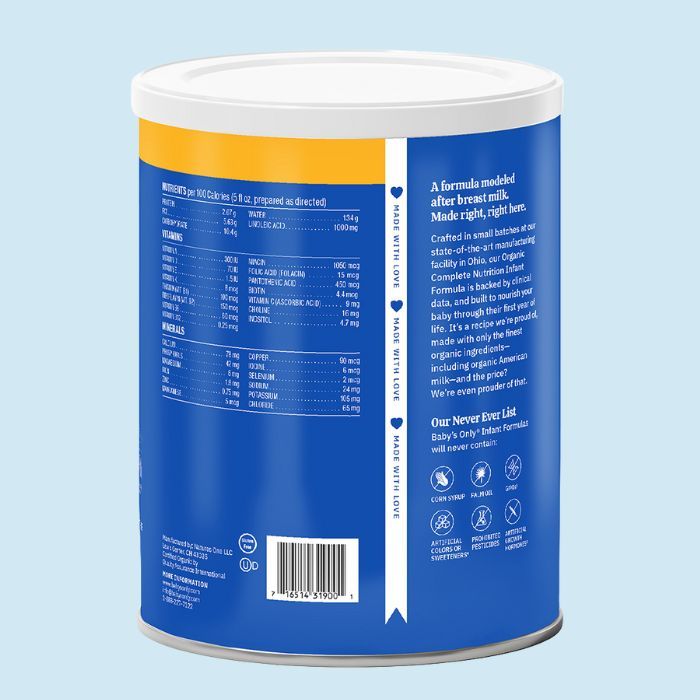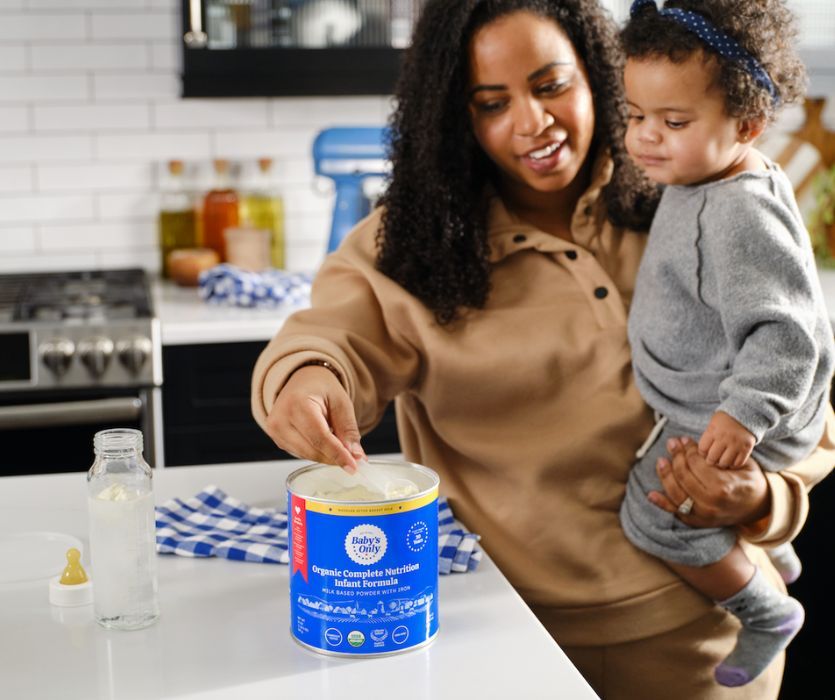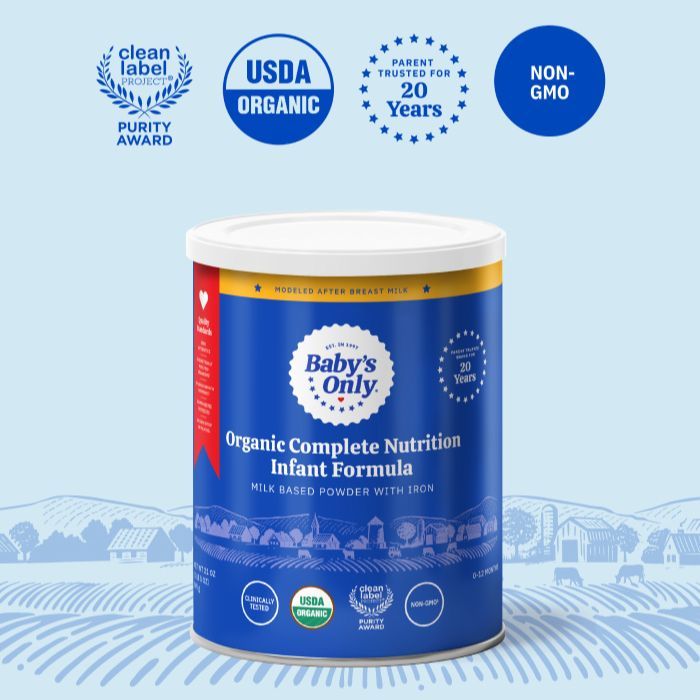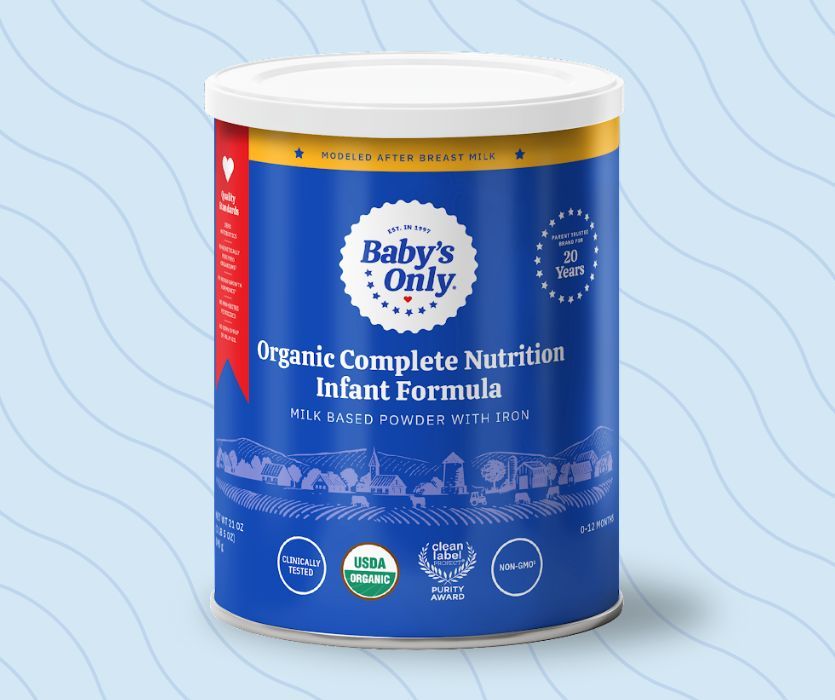With its affordable price point and high-quality ingredients, Baby’s Only organic infant formulas have been a well-kept secret among parents for years. In this article, we will take a closer look at Baby's Only formula, its ingredients, nutritional value, and potential benefits to see if it lives up to its hype.
Baby’s Only Background
For over 20 years, this company has been developing organic products, including America's first organic toddler formula. Their mission has always been to make organic formulas accessible to every family, and they make sure everything is top-notch through careful sourcing, testing, and production supervision to ensure a high standard of quality.
For infants, they make two formulas, Baby’s Only Organic Complete Nutrition Infant Formula, which is what I’m focusing on here, and Baby’s Only A2 Organic Milk Infant Formula for parents who are looking for an organic option that uses A2 proteins. (They are the only US-based company that makes an organic A2 formula which can be great for babies with sensitive tummies.)

Where is it made?
Baby's Only organic formula is made in the United States. The company's manufacturing facility is located in Ohio, and they control the production process from start to finish.
Is Baby’s Only formula FDA approved?
While the FDA doesn't approve infant formulas, they do mandate that 30 essential nutrients be included and the finished product is subjected to rigorous testing to ensure it meets all safety standards.
Baby's Only organic formula meets all of the FDA's requirements for safety and nutrition and it’s USDA Organic Certified which means it doesn’t contain GMOs, synthetic additives, and certain pesticides. Baby’s Only also avoids packaging that contains perfluoroalkyl and polyfluoroalkyl substances (PFAS) and was awarded the Clean Label Project Purity Award which means the ingredients and products are reviewed and tested by an independent third party.
Does Baby’s Only Formula have heavy metals?
Every supplier of Baby's Only ingredients is required to pass quality testing, especially for heavy metals, and the formula undergoes rigorous quality checks before it is sold, including heavy metal testing.

What are the ingredients in Baby’s Only?
- Organic Lactose
- Organic Nonfat Milk
- Organic High Oleic Sunflower Oil
- Organic Soybean Oil
- Organic Whey Protein Concentrate
- Organic Coconut Oil
- Less Than 2% of: Organic Soy Lecithin, Calcium Carbonate, Calcium Phosphate, Sodium Chloride, Potassium Chloride, Potassium Citrate, Magnesium Phosphate, Choline Bitartrate, Calcium Ascorbate, Inositol, Ferrous Sulfate, d-Alpha Tocopheryl Acetate, Zinc Sulfate, Niacinamide, Calcium Pantothenate, Biotin, Vitamin A, Thiamin Hydrochloride, Copper Sulfate, Riboflavin, Pyridoxine Hydrochloride, Sodium Selenate, Manganese Sulfate, Phylloquinone, Folic Acid, Vitamin D3, and Vitamin B12.
Comparison to Other Popular Organic Baby Formula Brands
The big difference between Baby’s Only and other organic baby formulas is the cost.
Organic formula is a premium product, and most brands run in the area of $1.25 to $1.70 per ounce.
With a Baby’s Only subscription, it comes down to $1.12 per ounce (that’s a big savings) so you’re getting a premium product at a more affordable price.
Other features that set it apart are the Clean Label Certification, the lack of palm oil or corn syrup, and the fact that it’s produced in the U.S.
Potential Drawbacks or Concerns
- Some parents noticed that it foams more than other formulas. To work around this, many parents add the powder to water (not water to the powder already in the bottle), which is recommended for safe measuring anyway.
- It doesn’t include some of the bells and whistles that some higher priced organic formulas include. Even though every brand of baby formula must adhere to the same fundamental nutritional standards, some add extra nutrients like DHA, ARA, prebiotics, and grass-fed milk, which is important to some parents.
- It is not vegan. It’s milk based vs. plant based.

Promising Customer Reviews and Feedback
“All my 5 children had this formula with zero issues, NO spit ups or tummy issues.” Target
“this formula is still the top option for discerning parents - no fillers/stabilizers, chemically derived additives, sourced from local organic dairies.” - Amazon
“I love that it’s organic and it doesn’t make my son’s poop smell like FISH for days!” Target
“It is the ONLY formula our daughter would take! The only formula we found that doesn’t have the same strong smell as other formulas. Highly recommend.” Amazon
“I love that this milk based infant formula is organic, has no corn syrup or palm oil, and it is also non gmo which is wonderful.” Walmart
Cost and Availability
A single 21oz (595g) can of Baby's Only Organic Complete Nutrition Infant formula will run you $28.99 ($1.38 per ounce). If you buy the larger 31.7 oz (900g) can and use subscribe and save, that cost comes down to $24.64 ($1.12 per ounce).
So for 12 cans (around a 3-month supply), you’d save somewhere in the region of $135 compared to something like Happy Baby Organic, which comes in around $372 for 12 cans.
They've also introduced a Refer-A-Friend program where every time you refer someone, you get $10 towards future purchases, and they’ll get $10 off their first purchase, which is a nice perk.
It’s widely available at Target, Amazon, Walmart, and Whole Foods, but to get the best price, it’s usually worth buying directly from the site.

Conclusion: Is Baby’s Only a Good Formula?
Baby’s Only Organic Complete Nutrition Infant Formulas are an excellent choice for top-quality nutrition without breaking the bank.
While they may not have some of the bells and whistles of higher-priced organic formulas, the cost savings and high-quality ingredients make it a great choice for budget-conscious parents. It’s readily available whether you order it directly from the Baby’s Only website or you have to make a panicked last-minute run to Target.
Its organic status, Clean Label Certification, and rigorous testing make it a safe and healthy option for your baby.
Also check out: Baby’s Only Vs. Kendamil: Which Baby Formula is Better?




Leave a Comment